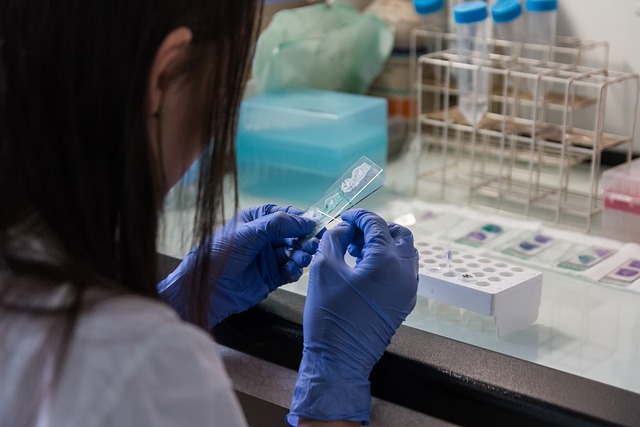Iron deficiency anemia, characterized by low iron levels, impairs oxygen transport, leading to fatigue and dizziness. In the UK, an Advanced Liver Blood Test (LBT) is key to diagnosing this condition, as it detects ferritin levels and reveals underlying liver problems affecting iron absorption. LBT markers like ALT, AST, ALP, and GGT, combined with Hb/Hct measurements, help doctors accurately diagnose IDA and treat both anemia and associated liver conditions through iron supplementation or addressing bleeding issues, emphasizing the importance of professional guidance.
Iron deficiency anemia is a common yet serious condition, often caused by inadequate iron intake or blood loss. Understanding its subtle symptoms is crucial for early detection. This comprehensive guide explores how advanced liver blood tests in the UK play a pivotal role in diagnosing this condition. We delve into interpreting test results and available treatment options, empowering individuals to take control of their health.
- Understanding Iron Deficiency Anemia and its Symptoms
- The Role of Advanced Liver Blood Tests in Diagnosis
- Interpreting Results and Available Treatment Options
Understanding Iron Deficiency Anemia and its Symptoms
Iron deficiency anemia is a common blood disorder where the body lacks adequate iron, a key component in red blood cell production. Iron plays a vital role in carrying oxygen from the lungs to various parts of the body. When there’s an iron deficit, red blood cells become smaller and fewer in number, leading to reduced oxygen distribution. This can result in fatigue, weakness, pale skin, shortness of breath, dizziness, and headaches—symptoms that often go unnoticed but significantly impact daily life.
In the UK, individuals with suspected anemia may undergo an Advanced Liver Blood Test, which includes comprehensive assessments beyond basic blood count analysis. This test can detect iron deficiency anemia by measuring ferritin levels, a protein that stores iron in the body. Low ferritin levels are indicative of iron depletion, allowing for early diagnosis and treatment to prevent further complications. Prompt identification and management of iron deficiency anemia through advanced testing like the Advanced Liver Blood Test UK are essential steps towards improving overall health and well-being.
The Role of Advanced Liver Blood Tests in Diagnosis
In addition to standard haemoglobin (Hb) and haematocrit (Hct) measurements, advanced liver blood tests play a crucial role in diagnosing iron deficiency anemia (IDA). These tests are particularly important because IDA can sometimes be accompanied by underlying liver conditions that affect iron absorption and storage. In the UK, healthcare professionals use various advanced liver enzymes like alanine aminotransferase (ALT), aspartate aminotransferase (AST), alkaline phosphatase (ALP), and gamma-glutamyl transferase (GGT) to assess liver health. Elevations in these enzymes can indicate liver damage or inflammation, which may be linked to iron malabsorption caused by conditions like hepatitis, cirrhosis, or biliary obstructions.
By combining results from standard anemia tests with advanced liver blood tests, doctors can gain a more comprehensive understanding of the patient’s overall health status. This integrated approach is vital for accurately diagnosing IDA and determining its underlying causes. Advanced Liver Blood Tests UK offer valuable insights that help tailor treatment strategies to address both the iron deficiency and any associated liver issues.
Interpreting Results and Available Treatment Options
After your blood test, the results will be analysed by a healthcare professional who will compare your iron levels to the normal range to determine if you have iron deficiency anaemia. An advanced Liver Blood Test (LBT) UK can provide comprehensive insights into various health markers, including iron levels. If anaemia is suspected, further tests might be required to confirm the diagnosis and identify any underlying causes.
Treatment options vary depending on the severity of your condition and potential underlying factors. Iron supplementation is often the first line of defence to restore iron levels and alleviate symptoms. In some cases, addressing specific issues like gastrointestinal bleeding or absorption problems may be necessary. Consulting with a healthcare provider is crucial for personalised guidance and effective management of iron deficiency anaemia.
Iron deficiency anemia is a common but treatable condition, and advanced liver blood tests in the UK play a crucial role in its diagnosis. By interpreting results accurately, healthcare professionals can offer appropriate treatment options to alleviate symptoms and improve overall health. These tests provide valuable insights into nutrient levels, enabling effective management of anemia and ensuring folks receive the necessary care.
